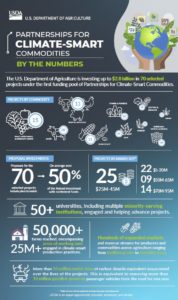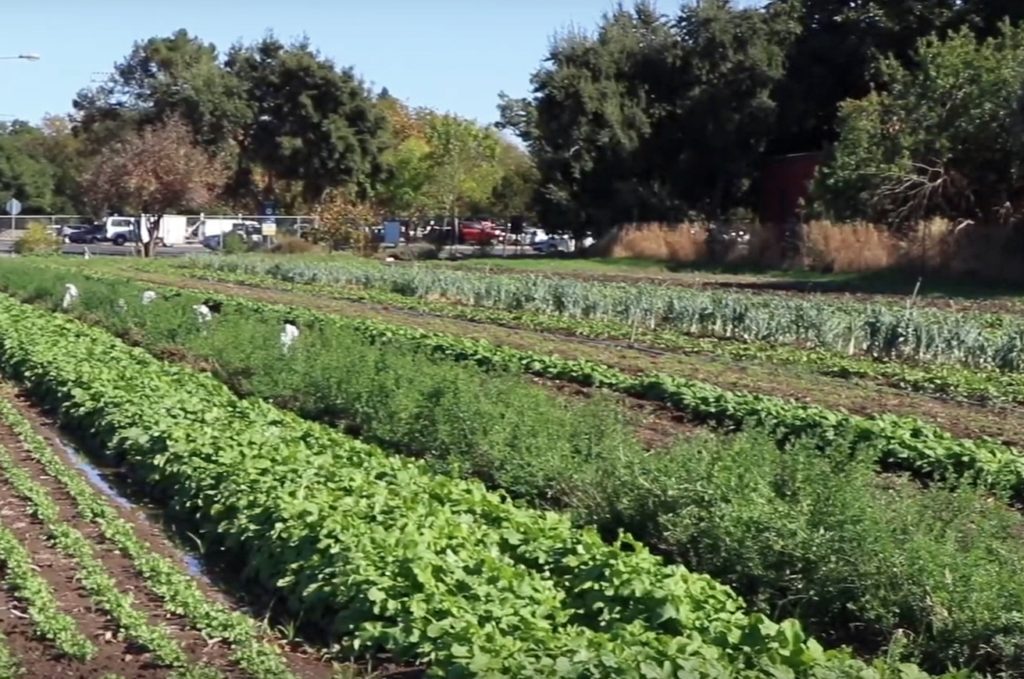Oct 13, 2022Specialty crop growers join USDA in climate initiative
The U.S. Department of Agriculture is awarding up to $2.8 billion in a massive initiative with 70 projects – 15 of them involving fruit, vegetable and other specialty crops – to address climate change.
The projects in the Partnerships for Climate-Smart Commodities program are designed to expand markets for climate-smart commodities, leverage greenhouse gas benefits of climate-smart (CS) commodity production and provide direct benefits to production agriculture, including for small and underserved producers.

“There is strong and growing interest in the private sector and among consumers for food that is grown in a climate-friendly way,” Agriculture Secretary Tom Vilsack said when announcing the funded projects. “ … This effort will increase the competitive advantage of U.S. agriculture both domestically and internationally, build wealth that stays in rural communities and support a diverse range of producers and operation types.”
Projects that have a specialty crop component, and the funding maximum for the project, include:
- Building Partnerships for CS Commodities in South Carolina ($70 million) – This Clemson University-led project involves 27 entities, including leafy greens producer W.P. Rawl and the South Carolina Specialty Crop Association, which will verify benefits of CS practices and support development of markets for commodities grown using those practices.
- Texas Climate-Smart Initiative ($65 million) – Led by Texas A&M Agrilife Research, this five-year project includes the Texas International Produce Association, Texas Citrus Mutual and the Texas Pecan Growers Association, with commodities ranging from vegetables to citrus, grapes and pecans. The initiative is designed to transition large crops to CS methods and develop markets.
- Climate-Smart Potatoes from the Pacific Northwest: Managing Soil Health for Climate-Smart Outcomes ($50 million) – Oregon State University leads this project of adopting CS management systems for potato production in Idaho, Washington and Oregon.
- Building Soil, Building Equity: Accelerating a Regenerative Farming Movement in Appalachia and the Southeast ($20 million) – This project seeks to build climate-smart markets and sequester carbon over thousands of acres of Appalachian and rural southeastern land, using fruit, vegetable, row crop and beef producers in Georgia, North and South Carolina, Virginia and other states.
- Elevated Foods Partnerships for Climate-Smart Commodities ($20 million) – This Elevated Foods-led project implements climate-smart production systems on a large scale across cropland, with a focus on fresh fruit and vegetable crops. Partners propose to implement practices on hundreds of thousands of acres planted to fruit and vegetables in key growing regions across the U.S.
- A Vibrant Future: Pilot Projects for Climate-Smart Fruit and Vegetable Production, Marketing, and Valuation of Ecosystem Services ($15 million) –The International Fresh Produce Association leads this project that will incentivize growers of fruits and vegetables to adopt climate-smart production to establish consumer-driven climate-smart markets.
Earlier this year, Vilsack announced that USDA had allocated $1 billion for the program, divided into two funding pools. Because of the demand, the Biden administration increased the total funding allocation to more than $3 billion, with projects from the second funding pool to be announced later this year. Vilsack made the announcement at Penn State University, which is the lead partner on one of the selected pilot projects to implement climate-smart practices, quantify and track the greenhouse gas benefits and develop markets for the resulting climate-smart commodities.
USDA will work with the applicants for the 70 identified projects to finalize the scope and funding levels in the coming months. A complete list of projects identified for this first round of funding is available at usda.gov/climate-smart-commodities.

















